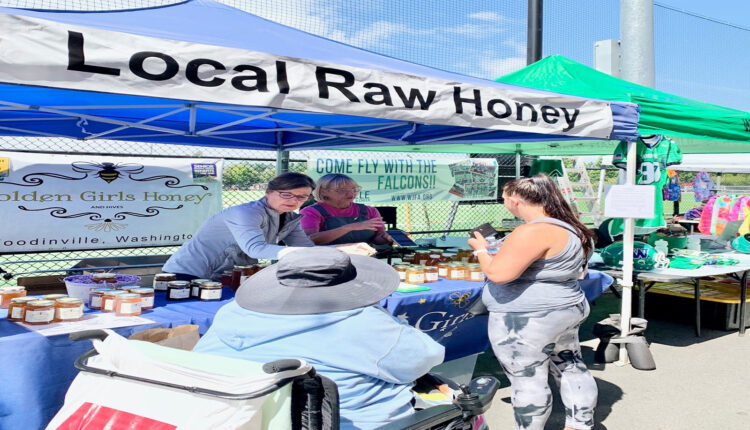
What’s the Buzz?
By Region 10 Advocate, Jennifer Clark
When meeting small business owners, I have always been struck by the enthusiasm they have for what they do. Carol Wardlow, owner of Golden Girls Honey and Hives in Woodinville, WA, was no exception. You might even say she buzzed about it.
Wardlow started beekeeping 10 years ago. A swarm flew into her backyard looking for a new home and she exclaimed, “let’s catch them!” She and her husband knew nothing about beekeeping, so it seemed a bit crazy. They found a place nearby that sold beekeeping equipment and the staff were able to give them an overview of beekeeping basics. Armed with their gear and some rudimentary instructions, the two returned home and caught the bees. Now, after completing classes and passing exams, the two are certified Apprentice Master Beekeepers.
The hives began producing honey after a year. Wardlow discovered the honey tasted different when derived from different pollens, depending on the bees’ location and which plants were in bloom – and all tasted very different than the basic clover honey available at most grocery stores. Each variety was so delicious, she wanted to share the flavor experience with others, and their business was born. Wardlow named the company for the bees – “the foragers are ‘girls’ (females) that look like golden streaks in the sun.”
It is not unusual for new small business owners to encounter surprises and challenges as they operate in the regulatory environment for the first time. Not so for Wardlow though. She said the National Honey Board (NHB) does a great job communicating criteria for pure honey and honey products. The NHB is an industry-funded agriculture promotion organization that operates under USDA oversight and was authorized by the Commodity Promotion, Research, and Information Act of 1996 and established under the rules and regulations of the Honey Packers and Importers Research, Promotion, Consumer Education and Industry Information Order. Operating funds come from assessments on honey production, but as a small producer, Wardlow is exempt.
From her perspective, the regulations in the industry are fair and adequate. However, Wardlow expressed concern about the negative impact on the market coming from products that are not pure honey. Pure honey has only one ingredient, yet some products called honey have additional ingredients. Of particular concern is honey coming from outside the US, most notably from China, which has been shown to have significant amounts of rice syrup. Wardlow suggested more enforcement to keep multiple-ingredient products from being labeled and marketed as honey would improve the competitive environment.
Enforcement of existing regulations is a theme that many small business owners have expressed to me. I wrote about another small business with similar concerns – Sweet Dreams Come True. I have also spoken with Aashay Salva, owner of Aash Farms in Woodinville, WA, and Sam Rudolph of PNW Grateful Gardens in Snohomish that have similar concerns. They raised this issue to me as a challenge in the organic produce sector, as many items are being falsely labeled as organic. Additionally multiple distillers in Washington and Oregon have described regulatory enforcement concerns in the distribution of distilled spirits. The Office of Advocacy submitted a comment letter, Advocacy Recommends Updates to TTB’s Alcohol Trade Practice Regulations, as distillers across the country were aligned in this assessment.
Wardlow shared another challenge: lack of awareness in some sectors of the agricultural community around the maintenance of healthy hives. This is important to our nation’s crops, yet agricultural practices sometimes harm the bees. Wardlow had a hive emergency a few weeks ago when the crop where the hives were located was being irrigated from above. This waterlogged the plants and washed off the pollen. As a result, there was too little for the bees to collect, which diluted their nectar, leading undernourished bees. They started dying from starvation and Wardlow had to move the hives to another location before whole colonies were lost.
Education is an area of opportunity for federal agencies and policies to facilitate collaborative projects between growers and beekeepers. This is particularly concerning as bee populations have been declining over the years. According to the USDA, the honeybee population decreased by 7% between January 1, 2022 and January 1, 2023. With more awareness about maintaining healthy bee populations, we can ensure Wardlow’s bees continue buzzing and producing their sweet honey for future generations to savor.
Jennifer Clark currently serves as the Regional Advocate for Region 10 covering Alaska, Idaho, Oregon, and Washington and can be reached via email at Jennifer.Clark@sba.gov. Please feel free to contact our regional advocates to share your small business’s regulatory burdens or concerns.
